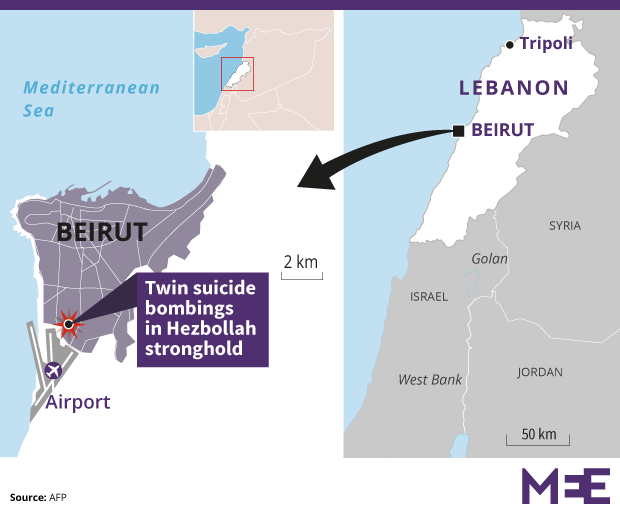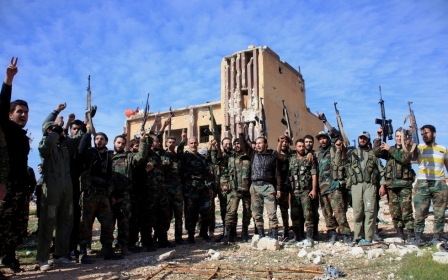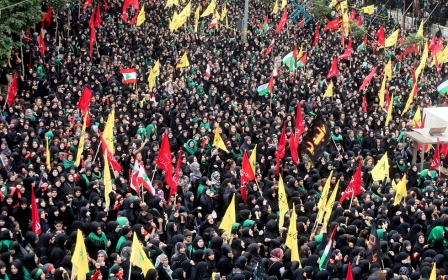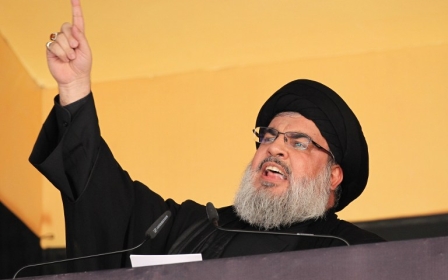Twin blasts rock Beirut suburb, at least 43 killed
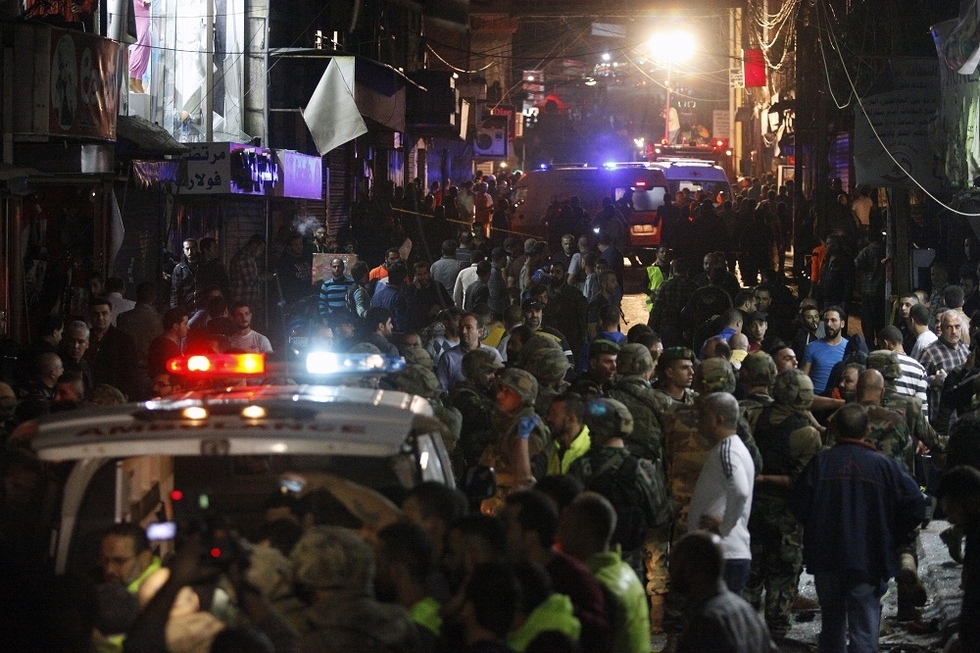
BEIRUT - Twin blasts have rocked the southern Beirut suburb of Burj al-Barajneh on Thursday. At least 43 people have died according to the Health Ministry although the figures could be even higher.
More than 200 others have been injured in the blasts, which hit a predominantly Shia neighbourhood seen as a Hezbollah stronghold. The Islamic State (IS) group has now claimed responsibility for the attacks, which are the biggest to hit the capital since the end of the civil war 25 years ago.
Witnesses said that there were only minutes between the two blasts, while Lebanon's official agency said that the blast sites were approximately 150 metres apart.
As the news broke, large crowds congregated, fearful for the fate of loved ones and friends, with the wounded being carried away on stretchers covered with white blankets. The mood was sombre with crowds singing religious songs while banners of fallen Hezbollah fighters, killed fighting in Syria, flew just meters away from the site of the explosion.
Hezbollah operatives, discernible by distinct yellow bands worn around their biceps, and Lebanese Armed Forces personnel were present on the scene and were attempting to restore calm late into the night. Several politicians and prominent Hezbollah members came to pay their respects.
Mohamad, a 22-year-old reporter for local a television station, was close to the blast site when the explosions went off.
"It was 5:50pm (1550GMT) and I was walking to the university when the explosion happened,” he told Middle East Eye. “Then, five minutes later, we heard the second blast. There were lots of people on the streets coming back from work and shopping before dinner."
"We are ready for anything that can happen, and we knew [an attack] would happen sooner or later,” he added.
Ahmad, a 26-year-old resident did not want to give his real name but told MEE that his friend had been killed. He blamed the bombing on a Syrian national who “was a worker in a nearby bakery” and seemed to be “a normal person”.
"I don't know what drove them (to commit the attack). I think they were brainwashed," said Ahmad, who proudly showed off an image of himself wearing military fatigues and said that the phone picture was taken while he worked "in logistics" for Hezbollah.
"Here, in the neighbourhood, we all support Hezbollah and its policies, also in Syria. We knew an attack would happen, and it does not change anything,” he said.
A national day of mourning has now been announced for Friday, with widespread condemnation ringing out from the political establishment and Prime Minister Tammam Salam saying: "We denounce this criminal act which can't be justified."
Some eyewitnesses, according to local Twitter accounts, claimed that Hezbollah leaders were close to the blast – although it is not yet known whether any Hezbollah figures were caught up in the twin explosions. Police said two men on foot set off suicide vests in front of a shopping centre in Burj al-Barajneh at around 6pm local time (1600GMT).
According to news website Now Lebanon, the damage could have been even worse, with initial reports indicating that a third would-be bomber was killed before he managed to detonate his suicide vest. Local media reports have since emerged that a fourth would-be bomber has been apprehended, although this has not been independently verified.
"Onlookers are still gathered outside the blast sites as Lebanon's ISF [Internal Security Forces] has issued an official statement appealing for residents to stay away from the site for their own safety and to ease the passage of emergency ambulances," Now Lebanon's reporters on the ground said.
While Lebanon saw a string of attacks in 2013 and 2014, it has been relatively calm for more than a year. The last incident in Lebanon's capital happened last June when a suicide bomber blew himself up after police tried to raid his Beirut hotel.
Al-Qaeda-linked groups and IS have both since said that they planned to target Lebanon, in particular Hezbollah areas. Hezbollah has been a key supporter of Syrian President Bashar al-Assad and a close ally of Iran and has waged a bloody campaign against largely Sunni rebel groups.
According to the UN, at least 220,000 people are believed to have been killed in the almost five-year-long conflict, with more than a million Syrian refugees now taking shelter in Lebanon.
Sami Nader, an economics and politics professor at St Joseph University in Beirut said that the timing of the attack could be linked to events earlier this week in Aleppo at the Kweris airbase which Syrian army forces captured from IS
"It shows a dynamic of you hit us on our turf, we will hit you on yours," he said.
Earlier in the day, the Lebanese Army successfully disarmed a bomb placed close to a popular cafe near the Jabal Mohsen neighbourhood in Lebanon's second city Tripoli. The largely Alawite neighbourhood, seen as close to Assad, who also hails from the Shia-linked sect, has long been a flashpoint. No group has as yet claimed responsibility for the incident, but a man wearing a suicide vest was also arrested in the city.
Imad Salamey, a political science professor at Lebanese American University, told MEE that Thursday's blast "marks an escalation, a new tactic used by Syrian radical groups".
"There has not been a bomb attack for a long time in the Hezbollah-dominated areas in Beirut's southern suburbs, which led to the impression that Hezbollah and the LAF [Lebanese Armed Forces] were capable of preventing such incidents," Salamey said.
"But this attack - in terms of the sophistication of the coordination with which it was carried out [and its attempts] to ensure a high number of casualties - marks a development from previous attacks in 2013-14. It shows that such radical groups, despite periods of calm, [remain] active across the Lebanese-Syrian border, and are capable of making well-orchestrated attacks in Beirut."
Makram Rabah, a Lebanese analyst and columnist, also said that the timing of the blast was symbolic of wider regional escalations.
"The Sunni-Shia tensions - especially in Yemen and Syria - have opened up Lebanon to these security breaches," he said. "The Lebanese state is unable to answer these challenges as both the Parliament and the cabinet are in limbo. The previous success to quell terrorism two years ago was made possible through internal cohesiveness which thus far remains elusive."
- Additional reporting by Simona Sikimic in London
Middle East Eye propose une couverture et une analyse indépendantes et incomparables du Moyen-Orient, de l’Afrique du Nord et d’autres régions du monde. Pour en savoir plus sur la reprise de ce contenu et les frais qui s’appliquent, veuillez remplir ce formulaire [en anglais]. Pour en savoir plus sur MEE, cliquez ici [en anglais].


